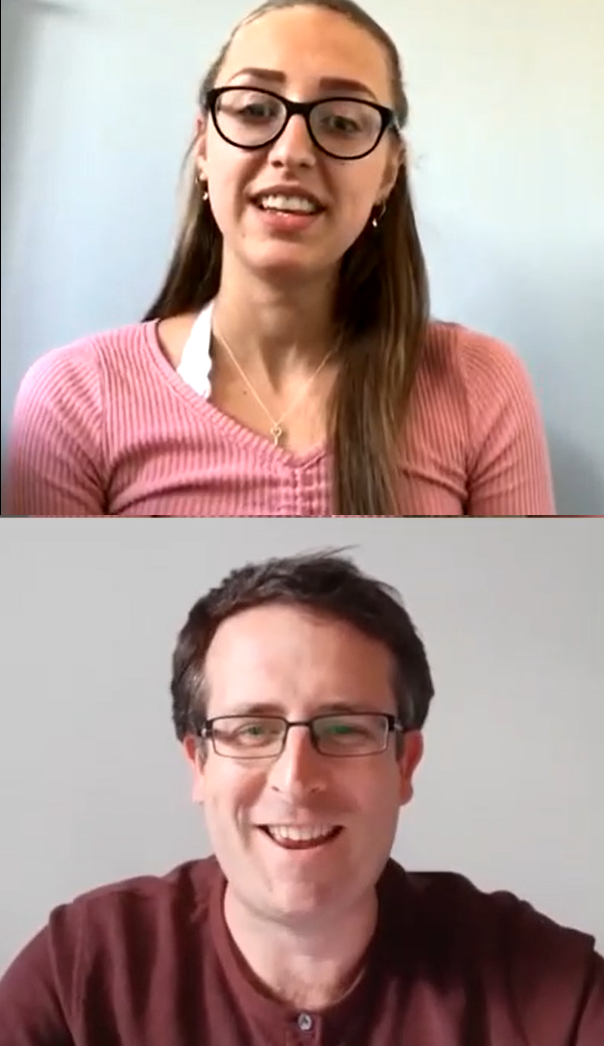Following the success of the Student Reference Group’s (SRG) debut on Instagram Live in April, a second broadcast was organised in May, this time providing insight into leadership. SRG member Chloe Dooley reflects on what was shared.
Leadership is an important skill being utilised by physiotherapists having to adapt and change to the current challenges of COVID-19 and yet it is a skill students often feel out of place to practise. On the 1st May, the Student Reference Group’s (SRG) took to Instagram Live to spread the message that leadership is for everyone, at any stage of their physiotherapy journey.

Hosted by myself, Chloe Dooley, along with support from my fellow SRG members Martin Smith, Rachel Overy and Sophie McAuliffe, the Live event saw over 200 students and clinicians engaging from across the UK to ask questions and share experiences. Ten days since its broadcast, the recording has been viewed over 500 times!
Martin kicked off the Live with his personal experiences of leadership during the past nine months as Chair of the SRG. Focusing on the importance of delegation, he reflected on how the SRG, as a team, can achieve more together than individually with the right direction and encouragement.
Members of the SRG were then joined by Bournemouth University student David Cabrini-Back who is part of the Council of Deans’ 150 Leaders programme. After explaining his involvement in the programme, David spoke about the importance of becoming the type of leader you want to be. This is not a one size fits all process. Rather, it involves challenging yourself to be in situations that require leadership skills and learning from these experiences.
The discussion ended with David sharing the quote: "If your actions inspire others to achieve more, learn more, do more and be more; then you’re a leader". Something as simple as empowering your patient to work effectively with the whole clinical team is leadership, which all students can achieve. Assume you have permission to try and, whatever the outcome, use the opportunity to reflect and learn. (Read David’s blog post on the 150 Leaders website.)
The second guest was Beth Sykes, or better known by students as @Generation_AHP. Unfortunately, Beth was unwell on the day, but kindly sent through some inspiring leadership lessons she had acquired en route to her Band 8 specialist role in older people’s care. Beth reported that communication is at the core of day-to day leadership as “individuals and teams feel well led if they feel well informed”. To achieve this, Beth stated that good listening is essential to “get to the route of the issue”.
As students, it is important to recognise good and not so good leaders in practice and to take inspiration from those who we admire as we progress in our careers.Beth suggested that, whilst on placement, we take opportunities to develop our leadership skills as even “a small project can lead to change if it is well led”.
Beth summarised what leadership means to her:
- Listening to understand: Often in leadership the key component is understanding the issue and listening to people around you, and empowering and facilitating them to achieve change. As the leader, it is not your role to do and fix everything.
- Decisions not to act: Leadership is also about deliberately not acting. In certain situations, allowing things to play out (without interference) can produce better outcomes. Knowing when to recognise these situations is something that takes lots of practice. Being a leader is a learning experience.
- Emotional Intelligence: Being a leader can be lonely and can come with pressure and expectation (that you put on yourself). This is a normal part of the journey, mostly because you learn how to be a leader on the job.
- Integrity (doing something because you know it is the right thing to do): Most people see a good leader as someone they respect and trust. It is therefore important to be open to feedback to help you grow. Staff who exhibit inflated egos and disregard for others are often frustrated and ineffectual. A leader is nothing without the people they are leading

Wrapping up the discussion, Sophie and I spoke about the importance of leadership in helping students to grow into well-rounded graduate physiotherapists. We discussed the challenge of imposter syndrome and reinforced the value of knowing that it is okay to make mistakes as a leader, as long as you can learn from the situation. The half-hour discussion ended with Sophie sharing a poignant quote that the CSP chief executive Karen Middleton said at the SRG’s training day back in August:
Managers do what is right. Leaders do the right thing.
Reflecting after the second Live event, the SRG shared their own leadership experiences and what they had learnt through their individual roles.
- Chloe Dooley (Cardiff University): "Being part of the SRG has shown me that as a leader, you’re only as strong as the team you’re working with and so I’ve really been able to challenge myself to empower and motivate those around me to help everyone achieve success. We need students to have great opportunities like these to discover their strengths and be inspired to become leaders of the future."
- Sophie McAuliffe (Queen Margaret University): "My role with the SRG has allowed me to develop my confidence and overcome the phenomenon of “imposter syndrome” which us students regularly face. CPD, learning and networking opportunities within the SRG have also contributed to developing my leadership abilities through this sense of improved confidence and, communication skills which help in situations requiring delegation and empowerment as a leader."
- Abigail Reily (Robert Gordon University): "The SRG has taught me the importance of leadership especially as most of our communication is by email and video as we are spread out across the UK. We have been able to set timeframes and make decisions in a timely manner. The democratic style has allowed us all to contribute, pushed our skills in innovation and allowed for individuals' strengths to be called upon when needed."
- Martin Smith (University of Brighton): "Leadership for me is about self-improvement, understanding how you can develop as a leader and taking the steps to do so. It’s true a fantastic team makes the leader as a leader alone cannot accomplish anything. Honing your skills to communicate better and work better collaboratively produces that team atmosphere. The SRG is really good at sharing tasks, enjoying the work and making the environment fun. We are 12 leaders who work as one."
- Graeme Cook (Northumbria University): “Leadership requires being organised, honest and taking responsibility for my own and others learning, to work with people in a positive, pro-active way. I learned that excellent communication is vital to learning and progressing alongside accepting advice from colleagues and understanding others’ needs."
- Anna Forbes (Ulster University): “For me leadership means being a team player; someone who can assess situations, listen to other people's opinions, and make judgement calls. It is also someone who understands the limit of their expertise and can step back, ask for help and allow others to take on the task. A leader should lead by action and example, not through dictatorship. Being on the SRG has taught me that everyone can be a leader and that each individual brings a unique aspect to the role."
- Rachel Overy (University of Birmingham): "The most important thing to remember is that we all have the ability to be leaders no matter what stage we are at in our careers. Leadership comes in so many different levels. I particularly like this quote from Karen Middleton: ‘Leadership is about doing the right thing and the differences you can make to people's lives’.”
The SRG would like to say a huge thank you to David Cabrini-Back and Beth Sykes (Generation AHP) for their contribution and to everyone who engaged. We would love to hear your student leadership experiences and get your feedback so please get in contact on Twitter or Instagram or by posting on the Students iCSP.
Number of subscribers: 1



































